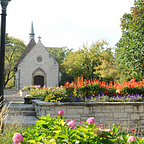Global Jesuits open up about possibility: Michael McNulty, S.J.
Mission Week Feature Series
What is your international ministry experience? How long did you spend there?
When I first traveled to Latin America as a Jesuit it was 1979, when I was a tertian. I worked in a little village up in the Andes in central Peru. It was about 1,800 people and six water faucets, with no electricity. I was there during the summer of ’79 and realized I wasn’t going to get any closure, so I went back in the summer of ’80. I was literally riding around on horseback baptizing babies. I have made many trips back to Latin America over the last 40 years.
Marquette Ministry Focus
I retired from Marquette University in the philosophy department in 2004 after 30 years. I came back here on a permanent basis 2015 as Scholar in Residence at the Center for Peacemaking. My responsibility is faculty relations. I spend a lot of time interacting with faculty and promoting the ideas of nonviolent peacemaking. The Center for Peacemaking has some money to give away and we also help support the Marquette Peace Studies program.
Most impactful or memorable experience abroad?
It’s hard to pin down one event. My first real radicalization was the murder of Rutillo Grande in El Salvador in 1977. He and two of his lay helpers were murdered by the Salvadorian military. However, I remember in Peru anointing a man of an indeterminate age who was dying of tuberculosis. He was lying on a pile of rags covered in flies, and I asked him if he wanted me to anoint him. He responded with “¿Cómo no, Padrecito? [“Why not?”] That was my first real experience of poverty, and it has colored my life ever since. That was certainly a turning point in my life.
How did your time working internationally change your approach to your ministry and its possibilities? How have you implemented those changes at Marquette?
For one thing, it changed my approach to teaching and changed what I taught. When I came here, I was hired to do philosophy of science — I had written my dissertation on quantum mechanics. The last course I taught before I left was on globalization and free trade. After my time in Peru, I started regularly teaching a course called contemporary ethical problems. I would teach from a selection of topics, anything from war to human rights, to economic justice, to racism and sexism. One of the things my experience forced me to do was look at those things in terms of concrete situations involving real people. I always had my students write cases. I would take the cases from the newspaper, and that was a practice I continued from the first time I taught that course all the way through to the end.
How does your international experience inform you of the Jesuit mission?
It made very concrete to me that Jesuits are sent to the world, not sent away from it. Our mission is to plunge in where people are actually living, be there, serve there, find God there and help other people find God there. That’s what we’re about. God is found in the sweat, in the dirt, in the problems and the joys. God is found everywhere. God is not a god who is far away from us. God is closer to us than we are to ourselves.
